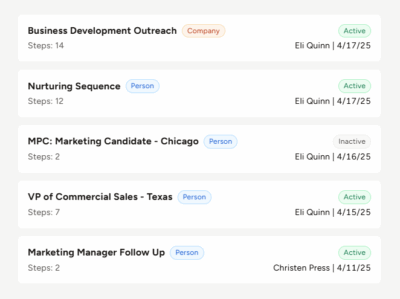No matter if you’re an agency recruiter, a corporate recruiter, or a member of Human Resources, the interviewing stage of the hiring process is one of the most important stages. In fact, it could be the most important stage. And in terms of behavioral-based interviews, “tell me about a time when” interview questions are perhaps the most critical set of questions for such an approach.
What is a behavioral-based interview?
So if we’re asking “tell me about a time when” interview questions during a behavioral-based interview, what is a behavioral-based interview?
A behavioral-based interview is an interviewing technique in which the recruiter or hiring manager asks the job candidate how they handled a certain situation in the past in an attempt to ascertain how the candidate might handle the same situation in the future if hired. Behavioral-based interviews are less about skills and experience and more about projecting the potential candidate into the responsibilities of the position.
As you might have already guessed, “Tell me about a time when” interview questions are an integral part of a behavioral-based interview. These questions ask candidates how they reacted in past situations. This way, you learn more about how the candidates actually acted on the job instead of how they might act in a hypothetical situation.
‘Tell me about a time when you made a mistake’ questions
There is no such thing as a perfect candidate, although there might be part of your brain that might still disagree. And since that’s the case, you’re going to interview imperfect candidates. During a behavioral-based interview, it’s your job to find out how they’ve been imperfect in the past and how they’ve dealt with their imperfections.
This is why you ask, “Tell me about a time you made a mistake.” (Even though that’s actually a statement and there’s no question mark after it.)
Making mistakes and experiencing adversity is inevitable, no matter how talented and experienced a candidate is. How a candidate responds to that adversity is very important, namely because how a person responds to adversity largely determines how successful they’ll ultimately be.
‘Tell me about a time when you failed’ interview questions
These are similar to “tell me about a time you made a mistake” interview questions, but with one difference. They deal with a situation that is bigger and more impactful. Making a mistake could be a smaller incident that had little to no bearing on a candidate’s job performance. Failing, on the other hand, represents adversity on a larger scale.
For example, you can make a mistake while attempting to complete an important project and that project could still be a success. That’s different than the project itself becoming a failure, either through a single mistake, or more likely, a string of them.
You never going to hire a job candidate who has never made a mistake, nor who has never failed. So you might as well find out what mistakes and failures are in their past, so you can determine how they reacted to them. Did they respond in a positive fashion? Or did they allow their mistakes and failures to adversely affect their future performance?
What are “tell me about a time when” interview questions?
As a recruiter, you want to interview candidates well so you get to know their characters.
“Tell me about a time when” interview questions are behavioral interview questions. They encourage candidates to share stories about their past jobs, education, or even personal lives. What the candidate shares can indicate whether they would be a good fit for the job at your client’s company.
“Think of a time when” interview questions are more in depth and personal than basic interview questions. For example, “Tell me a time when you had to work under pressure” reveals more real-life experiences than “Do you work well under pressure?”
You should ask positive and negative “tell me about a time when” questions to learn about your candidate’s strengths and weaknesses. And, you can find out whether the candidate learns from their mistakes. For example:
- Tell me about a time when you made a change at work. (positive)
- Tell me about a time when you failed at work. (negative)
Ask both general questions as well as ones that relate to the job order. Make sure to take notes so you can compare what candidates say.
When should you ask “tell me about a time when” interview questions?
You can ask “tell me about a time when” interview questions during the pre-interview screening and interviewing steps of the recruiting process.
Telephone screening helps you narrow your candidate pool. You can ask a few “name a time” interview questions during screening and relay the information to your client.
You might be present during face-to-face interviews, too. If so, you and your client should focus on “describe a time” interview questions. You can observe the candidate’s body language when they tell you about their past experiences.
List of interview questions: “Tell me about a time”
The questions you ask will depend on the job order. Typically, the format for “tell me about a time” interview questions is:
- Ask the candidate to talk about their real-life situation
- Prompt the candidate to talk about what they gained/learned from it
Hopefully, these questions will encourage candidates to think of how the situations relate to the open position. You can follow up with questions that relate to your client’s company. Here are 25 “tell me about a time when” interview questions you might use.
1. Tell me about a time when you reached a goal at work. How did you reach it?
2. Think of a time when you set a goal that you didn’t reach. Why didn’t you reach it? How did you handle it?
3. Tell me about a time when you were behind on your work. Why were you behind? What did you do to catch up?
4. Tell me about a time you led a team at work. Did any problems come up? How did you solve them?
5. Describe a time when you had a disagreement with your manager. What happened?
6. Think of a time when you didn’t get along with a co-worker. Did this impact your work?
7. Tell me about a time when you weren’t prepared for something (presentation, meeting, etc.). What did you do?
8. Did you ever have to adapt to a completely new system at work? Tell me about what you did to adapt.
9. Describe a time when you took initiative at work. Were the results positive? How did people react?
10. Tell me about a miscommunication with a co-worker. How did you work to prevent this in the future?
11. Describe the most stressful situation you have experienced at work. How did you handle it? Would you handle other situations like this in the future?
12. Tell me about a time when you had to solve a difficult problem.
13. Has there ever been a time you discovered a co-worker made a mistake? What did you do?
14. Tell me about a time when you made a mistake at work. Who discovered it, and what did you do to fix it?
15. Tell me about a time when you had to make a split second decision. How did it work out? Would you have chosen another option if you had more time?
16. Describe a time you regretted a decision you made at work. What would you do differently?
17. Tell me about a time when doing the right thing hurt you or your career. Would you make the same decision again?
18. Think of a time when you did something at work that went against your judgment. How would you react now?
19. Think of a time when someone personally attacked your work. How did you handle it?
20. Tell me about a time when you were juggling multiple projects at once. How did you prioritize?
21. Describe a time you encouraged someone (co-worker, boss, customer) to see things your way. Was the outcome successful?
22. Tell me about a time you were part of a team that you didn’t like. Why did you dislike the team? How did you cope?
23. Tell me about a time you were having a hard time balancing your personal and work life. What did you do to get through it?
24. Describe a situation where you had to problem solve.
25. Tell me about a time you wanted to quit. What did you do to motivate yourself?
The interview process and your ATS
Interviewing job seekers and candidates and selecting the best one for your job opening is easier when you use an applicant tracking system (ATS) or recruiting software package. That’s because the right ATS can help you screen and assess candidates more quickly. This way, you can streamline and expedite the hiring process. The longer you leave a position open, the more costly it is, so “time is money,” as they say.
Top Echelon Software is a leader in recruiting and hiring software for talent acquisition professionals, including internal recruiters and corporate HR. With Top Echelon, you can accelerate your pipeline of qualified candidates with our suite of screening and selection tools. These tools include the following:
- Custom workflows
- Pre-screening questions
- Interview notes
- A Rate and Rank system for assessment
Top Echelon Software is now offering free recruitment software for 15 days as part of its trial for talent acquisition professionals. During the trial period, you’ll have access to nearly all of the software’s features and functionality, with the exception of email through the platform. However, if you want more information, you can also request a live recruiting software demo. One of our account representatives will be glad to show you how Top Echelon can help you hire more top talent for your organization.
We also invite you to visit our recruitment software pricing page to see how affordable Top Echelon Software is. Top Echelon is recruiting software, simplified, and that’s why we’ve designed it to be easy to use, but also powerful enough to recruit, engage, and hire the best candidates in the job market.








